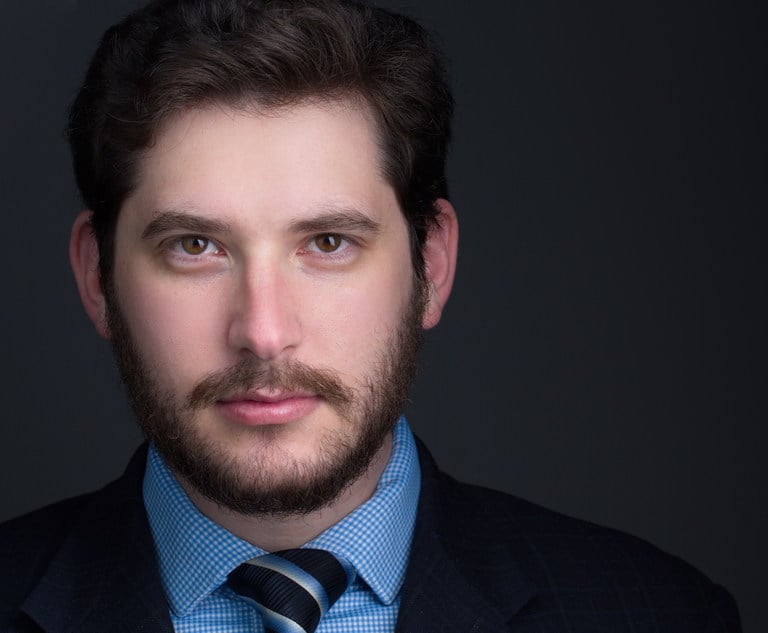GoFundMe? Not Without Rules, Say Lawyers Discussing the Perils of Crowdsourcing
After a New Jersey couple raised $400,000 via GoFundMe for a homeless veteran who'd given them his last $20 allegedly kept the cash for themselves, Miami attorneys Evelyn I. Suero and Monique D. Hayes assess the legalities of crowdsourcing.
September 13, 2018 at 02:35 PM
7 minute read
 Monique Hayes, of Goldstein & McClintock, Miami, and Evelyn Suero of Suero Law, Miami. Courtesy photo.
Monique Hayes, of Goldstein & McClintock, Miami, and Evelyn Suero of Suero Law, Miami. Courtesy photo.
As with any shiny new internet phenomenon, law and policy hasn't quite caught up to access monetary donations sent across states and nations at the touch of a button.
That became clear when lawyers stepped in to unravel what happened to the $400,000 raised by New Jersey couple Kate McClure and Mark D'Amico via a GoFundMe page for homeless veteran Johnny Bobbitt, who spent his last $20 and walked miles to get gas for McClure when she was stranded.
What started as a heartwarming story of a grateful woman pooling public generosity for a stranger who was kind even though he had so little soon turned into a cautionary tale. Not long after, the lawyers stepped in.
A legal battle ensued after the couple was pictured enjoying lavish trips and shopping sprees, while Bobbitt claimed he hadn't received the money.
Lawyer for homeless man: $400K in donations is all gonehttps://t.co/NAuqlnluyq pic.twitter.com/lTbQlqQTGH
— WSVN 7 News (@wsvn) September 5, 2018
'Not Much Oversight'
Crowdsourcing platforms arose to make it easier for a single person to raise money. But according to Miami finance lawyers Evelyn I. Suero and Monique D. Hayes, they also raised new problems.
“If you make it easy to collect money, you also make it really easy for fraud to occur,” said Suero, who specializes in business transactions and helps nonprofits start up and obtain licenses to solicit donations.
According to Suero, many people assume crowdsourcing is more regulated than it is.
“There's not much oversight,” she said. “You can pretty much solicit without a license if you're doing it for one person, either yourself or one named individual.”
Another nuance: Nonprofit organizations need a license to raise funds, whereas individuals, like McClure and D'Amico, do not, leaving up to donors to navigate the legitimacy of online fundraisers.
And sometimes they get it wrong.
In May, for instance, police uncovered a pair of fundraisers who'd collected more than $3,000 through a heart-wrenching fiction. They arrested that New York couple for allegedly using a GoFundMe page to collect donations from strangers under the guise that their 10-year-old son had cancer. And in 2015, a man allegedly crowdsourced money for his friend's sick baby, then kept it for himself.
“If we're going to have websites that appeal to the good in people's hearts, we have to protect them as well,” Suero said. “Now we have Hurricane Florence, we're going to see a bunch of GoFundMe pages pop up for that, and I don't know.”
Though many crowdsourcing sites ”are trying to help” by encouraging people to follow the law, Suero concedes she sometimes doubts the validity of online campaigns.
“There's a lot of things I'd like to donate but I don't know if it's legitimate. I don't know if there are enough protections available for me to feel confident,” she said. “If something takes place I'd rather just give to a big organization like the Red Cross. And even then, people have argued here and there about whether the money goes where's it's supposed to go. I don't know.”
Litigation Costs
Hayes, who's practiced business and bankruptcy law for 14 years, said the issue is that crowdsourcing platforms rely on public faith in a “promise” about what will be done with the funds.
“The reason why these types of platforms are susceptible to fraud is because they're really based on trust,” she said. “Once a complaint is filed or something goes wrong, there's nothing on the front end that is going to vet and sort through whether a process is legitimate or whether there's a particular criteria for the donation to be made.”
Another concern: Individual crowdfunding is “ripe for fraud,” according to Hayes, because most contributions are made in small amounts.
“If you donated individually $25, then it would cost you $250 just to file a lawsuit, just to see. Imagine if you have to hire a lawyer, that may be $5,000,” Hayes said. “If the lawyer is going to be involved in a case for a long time, it can go up until the multiples of thousands of dollars.”
The incentive is low for people to seek legal remedies when funds are collectively misused, according to Hayes.
For that reason, authority to prosecute lies with the Federal Trade Commission and the state attorney general.
Shouldering the Risk
 Photo: Twinsterphoto/Shutterstock.com
Photo: Twinsterphoto/Shutterstock.comThe Terms and conditions of GoFundMe point out that “all donations are at your own risk.”
“They pretty much put the burden on the donors and the organizers,” Suero said. “But it would be good if websites like GoFundMe would at least mention it and say, 'You may have to deposit this in a trust account because you may be subject to criminal penalties.'”
The GoFundMe guarantee states, “if funds aren't delivered to the right person, we will donate the missing amount.” Provisions like these are set up to protect people like Bobbitt from fraud, but according to Suero, more oversight and enforcement is needed.
“It says on the GoFundMe website that if you're raising funds for an organization and you're not affiliated with them, you should just withdraw it and give the funds to the organization. I mean, really? How easy is that for someone to now raise money and commit fraud? I looked at it and I was just shocked because it's contradictory to their own terms,” Suero said.
In Florida, the Solicitation of Contributions Act dictates that donations must be sent to a trust or depository account for the named beneficiary, as opposed to simply being withdrawn by the individual who raised the funds. But in New Jersey, that's not the case.
“This would have helped the homeless gentleman, because the funds would have been deposited in a trust account, and the court would be supervising and making sure that the funds go to the purpose for which the funds were raised,” Suero said.
But the downside to that, though, according to Hayes, is that each new regulation could delay the process of getting resources to the people and charities who need them.
“There's a balance that needs to be struck between the federal and state regulators and the host sites in order to lessen the likelihood of consumer fraud,” Hayes said.
According to Suero, educating donors and organizers about the law would mean “people can donate with confidence, knowing there's some oversight. Because right now, you ask anybody and they say, 'I've heard the news stories. That's not going to go to the person,' and that's sad.”
Related stories:
Legal Defense Fund Formed for Paul Manafort
Jewish Bar's 'Adopt a Nazi' Fundraiser Goes Viral
Irma Victims Getting Help From Developer, Builder and Realtors
This content has been archived. It is available through our partners, LexisNexis® and Bloomberg Law.
To view this content, please continue to their sites.
Not a Lexis Subscriber?
Subscribe Now
Not a Bloomberg Law Subscriber?
Subscribe Now
NOT FOR REPRINT
© 2025 ALM Global, LLC, All Rights Reserved. Request academic re-use from www.copyright.com. All other uses, submit a request to [email protected]. For more information visit Asset & Logo Licensing.
You Might Like
View All
Tragedy on I-95: Florida Lawsuit Against Horizon Freight System Could Set New Precedent in Crash Cases
2 minute read
'You Lied to the Jury': Veteran Awarded $5 Million in Defamation Case Against CNN
4 minute read
Vedder Price Shareholder Javier Lopez Appointed to Miami Planning, Zoning & Appeals Board
2 minute readTrending Stories
Who Got The Work
J. Brugh Lower of Gibbons has entered an appearance for industrial equipment supplier Devco Corporation in a pending trademark infringement lawsuit. The suit, accusing the defendant of selling knock-off Graco products, was filed Dec. 18 in New Jersey District Court by Rivkin Radler on behalf of Graco Inc. and Graco Minnesota. The case, assigned to U.S. District Judge Zahid N. Quraishi, is 3:24-cv-11294, Graco Inc. et al v. Devco Corporation.
Who Got The Work
Rebecca Maller-Stein and Kent A. Yalowitz of Arnold & Porter Kaye Scholer have entered their appearances for Hanaco Venture Capital and its executives, Lior Prosor and David Frankel, in a pending securities lawsuit. The action, filed on Dec. 24 in New York Southern District Court by Zell, Aron & Co. on behalf of Goldeneye Advisors, accuses the defendants of negligently and fraudulently managing the plaintiff's $1 million investment. The case, assigned to U.S. District Judge Vernon S. Broderick, is 1:24-cv-09918, Goldeneye Advisors, LLC v. Hanaco Venture Capital, Ltd. et al.
Who Got The Work
Attorneys from A&O Shearman has stepped in as defense counsel for Toronto-Dominion Bank and other defendants in a pending securities class action. The suit, filed Dec. 11 in New York Southern District Court by Bleichmar Fonti & Auld, accuses the defendants of concealing the bank's 'pervasive' deficiencies in regards to its compliance with the Bank Secrecy Act and the quality of its anti-money laundering controls. The case, assigned to U.S. District Judge Arun Subramanian, is 1:24-cv-09445, Gonzalez v. The Toronto-Dominion Bank et al.
Who Got The Work
Crown Castle International, a Pennsylvania company providing shared communications infrastructure, has turned to Luke D. Wolf of Gordon Rees Scully Mansukhani to fend off a pending breach-of-contract lawsuit. The court action, filed Nov. 25 in Michigan Eastern District Court by Hooper Hathaway PC on behalf of The Town Residences LLC, accuses Crown Castle of failing to transfer approximately $30,000 in utility payments from T-Mobile in breach of a roof-top lease and assignment agreement. The case, assigned to U.S. District Judge Susan K. Declercq, is 2:24-cv-13131, The Town Residences LLC v. T-Mobile US, Inc. et al.
Who Got The Work
Wilfred P. Coronato and Daniel M. Schwartz of McCarter & English have stepped in as defense counsel to Electrolux Home Products Inc. in a pending product liability lawsuit. The court action, filed Nov. 26 in New York Eastern District Court by Poulos Lopiccolo PC and Nagel Rice LLP on behalf of David Stern, alleges that the defendant's refrigerators’ drawers and shelving repeatedly break and fall apart within months after purchase. The case, assigned to U.S. District Judge Joan M. Azrack, is 2:24-cv-08204, Stern v. Electrolux Home Products, Inc.
Featured Firms
Law Offices of Gary Martin Hays & Associates, P.C.
(470) 294-1674
Law Offices of Mark E. Salomone
(857) 444-6468
Smith & Hassler
(713) 739-1250







